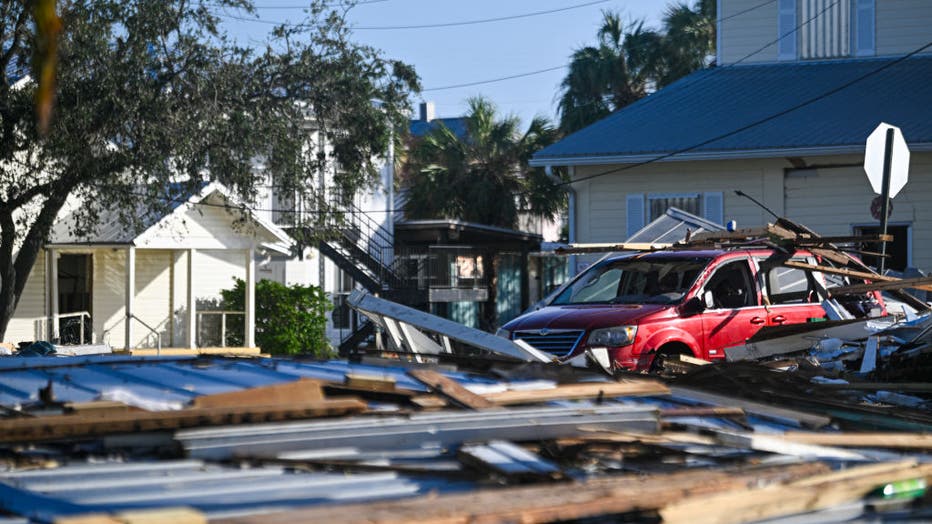Top 10 tips for homeowners after a major hurricane: Protect yourself from pitfalls
ATLANTA - Good Day Atlanta wants to make sure you have the knowledge you need to navigate the aftermath of Hurricane Helene. Storm damage like downed trees, flooded basements, stranded vehicles, and damaged roofs can be overwhelming. Unfortunately, homeowners are often vulnerable to exploitation, whether from insurance companies trying to minimize payouts or unscrupulous contractors inflating repair costs.
FOX 5 real estate expert John Adams shared his top ten essential tips to protect yourself from being taken advantage of by insurance companies and profiteering contractors after a hurricane:
1. Document the damage Immediately
As soon as it is safe, take comprehensive photos and videos of all your damages. This includes flooded areas, damaged roofs, downed trees, and vehicles affected by flooding. Detailed documentation will be crucial when filing your insurance claim and will provide a clear record of the hurricane’s impact on your property.
2. Review your insurance policy carefully
Before speaking with your insurance company, take time to review your homeowners' insurance policy to understand what is covered. Pay attention to coverage limits for storm damage, water damage, and exclusions for flood damage, which may require separate flood insurance. Knowing what is covered can help you challenge any unfair denial of claims.

Debris left by Hurricane Helene after making landfall are seen in Cedar Key, Florida, on Sept. 27, 2024. (Photo by MIGUEL J. RODRIGUEZ CARRILLO/AFP via Getty Images)
3. Contact your insurance company as soon as possible
Notify your insurance company immediately to begin the claims process. Delays in reporting damage can lead to complications with your claim. Ask for clarification on the timelines for filing claims and how long they expect the process to take. This ensures your insurer follows the appropriate procedures and cannot claim negligence on your part for late filing.
4. Beware of "storm chaser" contractors
After major disasters, "storm chaser" contractors often flood affected areas, offering quick fixes at inflated prices. These contractors may provide substandard work or demand full payment upfront and then disappear. Always verify that any contractor you hire is licensed, insured, and has a good reputation. Check references, read reviews, and ensure you have a detailed written contract before any work begins.
5. Get multiple repair estimates
Don't rush into hiring the first contractor you come across. Obtain at least three estimates from reputable contractors, and compare the costs and scope of the work. Be wary of any bids that are unusually high or low. This will give you a better sense of the fair market price for the repairs and help you avoid being overcharged.
6. Be cautious of Assignment of Benefits (AOB) contracts
Some contractors may ask you to sign an "Assignment of Benefits" (AOB) form, which gives them the right to deal directly with your insurance company and receive payment. While this can speed up repairs, it can also leave you vulnerable to fraud or inflated claims that your insurer may refuse to pay. Always consult a legal or insurance professional before signing any such agreement.
7. Don't accept the first offer from your insurance company
Insurance companies often aim to minimize payouts by offering low initial settlements. You are not obligated to accept their first offer. Review the settlement carefully and consult with an independent professional, such as a public claims adjuster or an attorney specializing in insurance claims, to make sure the settlement is fair.
8. Consider hiring a public claims adjuster
If you feel your insurance company is not meeting its responsibilities or is offering a payout that does not adequately cover the damage, consider hiring a public claims adjuster. These professionals work on behalf of homeowners, not the insurance company, and can help you negotiate a fair settlement. Keep in mind that public adjusters charge a fee, usually a percentage of your insurance payout, but their expertise can be invaluable.
9. Check for price gouging
In the aftermath of a hurricane, unscrupulous contractors and vendors may engage in price gouging — charging inflated prices for essential services and materials. Georgia law prohibits price gouging after a declared state of emergency. If you suspect you're being charged excessively for repairs, materials, or services, report the contractor to John King, the Georgia Commissioner of Insurance. His phone number is (404) 656-2070.
10. Stay organized and keep a paper trail
Keep meticulous records of all communications with your insurance company, contractors, and adjusters. Save emails, take notes during phone calls, and document any expenses incurred due to the damage, including temporary housing, repairs, and cleanup. Having a clear paper trail will be essential if you need to dispute a claim or file a complaint.
The Bottom Line: Protect your rights and property
After a hurricane, emotions run high, and the urgency to restore your home can leave you vulnerable. However, by following these tips, you can protect yourself from being taken advantage of by insurance companies and contractors alike. If your insurance company refuses to meet its responsibilities, don't hesitate to stand up for your rights. Hiring a public claims adjuster or even seeking legal advice may be necessary to ensure your insurance company fulfills its obligations. By taking this advice, you can recover from the storm without falling victim to exploitation.

